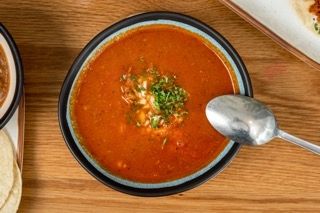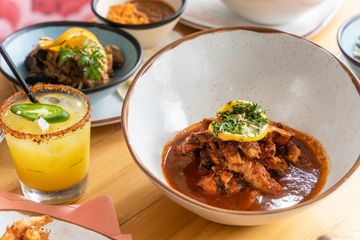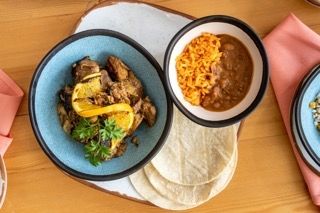Make every bite memorable with lunch and dinner favorites that bring out Mexico’s finest dishes
Is Mexican Food Healthy? Unboxing the Nutritional Conveniences of Standard Active Ingredients
The concern of whether Mexican food is healthy and balanced invites an expedition of its traditional components. Beans and corn function as foundational staples, abundant in protein and fiber. Avocados supply useful fats, while numerous herbs and flavors include flavor and health and wellness advantages - mexican food. Together, these elements develop a tapestry of nutrition. The healthfulness of Mexican food usually depends on preparation techniques and part dimensions. What duty do these variables play in determining its overall nutritional value?
The Power of Beans: Protein and Fiber-Rich Staples
Although usually neglected, beans work as a foundation of Mexican food, using a wide range of dietary advantages. Rich in protein, they are an excellent plant-based alternative for those looking for to satisfy their nutritional healthy protein requires. This high healthy protein web content sustains muscular tissue repair and growth, making beans indispensable for both vegetarians and meat-eaters alike. Furthermore, beans are a remarkable source of dietary fiber, which assists in digestion and advertises a sensation of volume, possibly assisting with weight monitoring.
The selection of beans made use of in Mexican dishes, such as black beans, pinto beans, and kidney beans, contributes to a diverse taste account and can improve meals nutritionally. Furthermore, beans are low in fat and contain important vitamins and minerals, consisting of folate, magnesium, and iron. Together, these features make beans a critical component, delivering both nourishment and nutrition in conventional Mexican price.

Corn: a Versatile Grain With Nutritional Perks
Corn stands out as a flexible grain fundamental to Mexican cuisine, commemorated not just for its culinary applications however additionally for its impressive nutritional account. As a main active ingredient in meals like tortillas, tamales, and pozole, corn provides necessary nutrients that add to a well balanced diet regimen. Rich in carbohydrates, it serves as a substantial power source, while also being low in fat, making it a positive alternative for numerous dietary needs.
Furthermore, corn is a great resource of nutritional fiber, which aids in digestion and promotes satiety. It consists of considerable quantities of vitamins such as B-complex vitamins, which are crucial for energy metabolism. The presence of antioxidants, particularly carotenoids, contributes to overall health and wellness by minimizing oxidative anxiety. In addition, corn is gluten-free, providing to those with gluten level of sensitivities. Generally, the dietary benefits of corn underscore its importance in conventional Mexican food and its role in a healthy diet.
Avocados: Healthy Fats and Nutrients in Every Bite
Avocados play a significant role in Mexican cuisine, complementing dishes with their velvety appearance and abundant taste. Beyond their culinary appeal, avocados are commemorated for their excellent nutritional profile. They are an abundant resource of healthy monounsaturated fats, which can help reduced poor cholesterol levels and support heart wellness. In addition, avocados are loaded with necessary minerals and vitamins, including potassium, vitamin E, and B vitamins, adding to total wellness.
The high fiber content in avocados help food digestion and promotes satiation, making them a valuable enhancement to any type of dish. Their special nutrient structure can also sustain skin wellness and supply anti-inflammatory benefits. Including avocados into traditional Mexican recipes or enjoying them web as a standalone treat can improve both flavor and nourishment, demonstrating why they are a precious staple in Mexican cuisine. On the whole, avocados use a delicious means to take pleasure in healthy fats and critical nutrients in every bite.

Natural Herbs and spices: Flavorful Health And Wellness Boosters
While appreciating the rich tastes of Mexican cuisine, one can not neglect the necessary duty that spices and herbs play in improving both taste and health and wellness. Ingredients such as cilantro, chili, and oregano peppers not only add to the lively taste account yet additionally provide significant wellness advantages. As an example, cilantro is recognized for its cleansing residential or commercial properties, assisting to remove hefty steels from the body, while oregano is loaded with anti-oxidants and has anti-inflammatory results.
Chili peppers, a staple in many Mexican dishes, contain capsaicin, which has actually been connected to boosted metabolic process and pain relief. Additionally, spices like cumin and coriander support food digestion and might help in blood sugar level guideline. Integrating these tasty health and wellness boosters right into dishes not only enhances the cooking experience yet likewise promotes total health, making Mexican cuisine not just scrumptious, however also nutritionally advantageous.
Typical Food Preparation Methods: Enhancing Nourishment and Taste
Conventional cooking approaches in Mexican cuisine play an important duty in boosting both nutrition and taste, as they commonly prioritize fresh ingredients and classic techniques. Methods such as nixtamalization, where corn is soaked and prepared in an alkaline service, not just enhance the nutrient profile of tortillas yet likewise enhance their digestibility - mexican food. Furthermore, making use of slow-moving food preparation techniques, like stewing or braising, enables tastes to combine wonderfully while preserving the stability of the ingredients

Often Asked Questions
Are Mexican Food Portions Commonly Larger Than Other Foods?
Mexican food portions are typically bigger than those of many various other cuisines. This characteristic mirrors conventional dining practices, emphasizing common sharing and hearty meals, which can cause an extra significant offering dimension generally.
Exactly how Does the Preparation Method Affect Healthfulness of Mexican Food?
Preparation techniques significantly affect the healthiness of Mexican food. Techniques such as barbecuing or steaming protect nutrients, while frying can raise undesirable fat web content. Choices of ingredients you could try here and cooking styles inevitably identify general dietary worth.
Can Mexican Food Be Customized for Certain Dietary Limitations?
Mexican food can undoubtedly be customized for details dietary limitations. Substitutions, such as utilizing corn tortillas for gluten-free diets or including more veggies, allow individuals to enjoy traditional tastes while accommodating various dietary needs.
What Prevail False Impressions About Mexican Food and Health And Wellness?
Typical mistaken beliefs regarding Mexican food include the belief that it is naturally undesirable, excessively hot, and only concentrated on fats. In reality, conventional recipes commonly feature nourishing components and can be customized to different dietary needs.
Are There Healthier Alternatives at Mexican Dining Establishments?
Healthier options at Mexican dining establishments often consist of smoked meats, beans, and fresh veggies. Choosing dishes that emphasize whole ingredients and staying clear of hefty sauces can result in a more nourishing eating experience, promoting general wellness.
The variety of beans made use of in Mexican dishes, such as black beans, pinto beans, and kidney beans, adds to a varied flavor profile and can improve meals nutritionally. Avocados play a considerable function in Mexican food, matching dishes with their creamy texture and abundant flavor. Integrating avocados right into typical Mexican dishes or appreciating them as a standalone snack can improve both taste and nutrition, showing why they are a precious staple in Mexican food. While delighting in the abundant tastes of Mexican cuisine, one can not ignore the necessary duty that spices and herbs play in enhancing both preference and health. Traditional cooking methods in Mexican cuisine play an essential duty in improving both nutrition and flavor, as they typically focus on fresh components and time-honored methods.